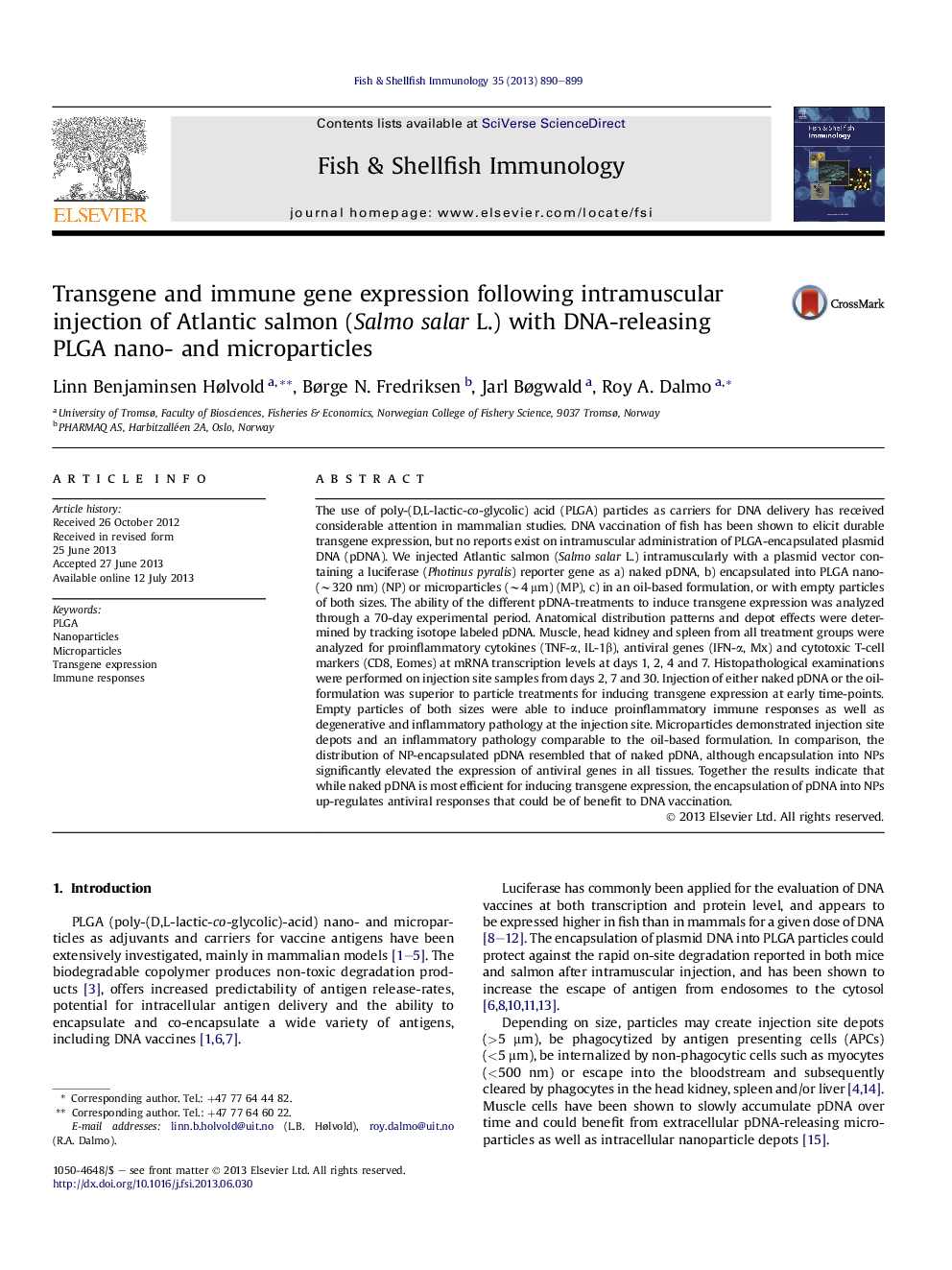| کد مقاله | کد نشریه | سال انتشار | مقاله انگلیسی | نسخه تمام متن |
|---|---|---|---|---|
| 10972062 | 1106768 | 2013 | 10 صفحه PDF | دانلود رایگان |
عنوان انگلیسی مقاله ISI
Transgene and immune gene expression following intramuscular injection of Atlantic salmon (Salmo salar L.) with DNA-releasing PLGA nano- and microparticles
دانلود مقاله + سفارش ترجمه
دانلود مقاله ISI انگلیسی
رایگان برای ایرانیان
کلمات کلیدی
موضوعات مرتبط
علوم زیستی و بیوفناوری
علوم کشاورزی و بیولوژیک
علوم آبزیان
پیش نمایش صفحه اول مقاله

چکیده انگلیسی
The use of poly-(D,L-lactic-co-glycolic) acid (PLGA) particles as carriers for DNA delivery has received considerable attention in mammalian studies. DNA vaccination of fish has been shown to elicit durable transgene expression, but no reports exist on intramuscular administration of PLGA-encapsulated plasmid DNA (pDNA). We injected Atlantic salmon (Salmo salar L.) intramuscularly with a plasmid vector containing a luciferase (Photinus pyralis) reporter gene as a) naked pDNA, b) encapsulated into PLGA nano- (â¼320 nm) (NP) or microparticles (â¼4 μm) (MP), c) in an oil-based formulation, or with empty particles of both sizes. The ability of the different pDNA-treatments to induce transgene expression was analyzed through a 70-day experimental period. Anatomical distribution patterns and depot effects were determined by tracking isotope labeled pDNA. Muscle, head kidney and spleen from all treatment groups were analyzed for proinflammatory cytokines (TNF-α, IL-1β), antiviral genes (IFN-α, Mx) and cytotoxic T-cell markers (CD8, Eomes) at mRNA transcription levels at days 1, 2, 4 and 7. Histopathological examinations were performed on injection site samples from days 2, 7 and 30. Injection of either naked pDNA or the oil-formulation was superior to particle treatments for inducing transgene expression at early time-points. Empty particles of both sizes were able to induce proinflammatory immune responses as well as degenerative and inflammatory pathology at the injection site. Microparticles demonstrated injection site depots and an inflammatory pathology comparable to the oil-based formulation. In comparison, the distribution of NP-encapsulated pDNA resembled that of naked pDNA, although encapsulation into NPs significantly elevated the expression of antiviral genes in all tissues. Together the results indicate that while naked pDNA is most efficient for inducing transgene expression, the encapsulation of pDNA into NPs up-regulates antiviral responses that could be of benefit to DNA vaccination.
ناشر
Database: Elsevier - ScienceDirect (ساینس دایرکت)
Journal: Fish & Shellfish Immunology - Volume 35, Issue 3, September 2013, Pages 890-899
Journal: Fish & Shellfish Immunology - Volume 35, Issue 3, September 2013, Pages 890-899
نویسندگان
Linn Benjaminsen Hølvold, Børge N. Fredriksen, Jarl Bøgwald, Roy A. Dalmo,